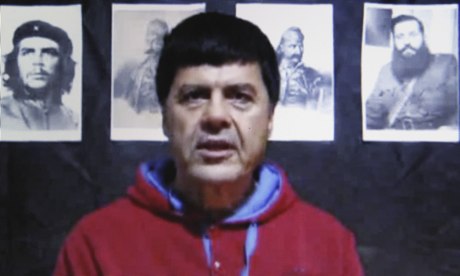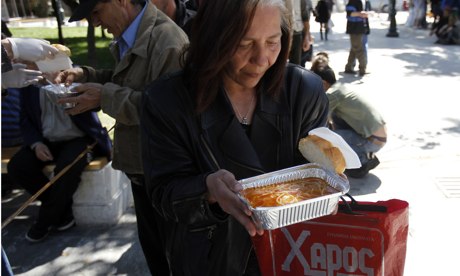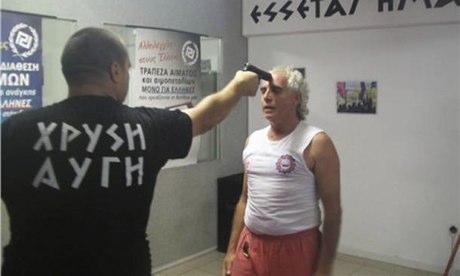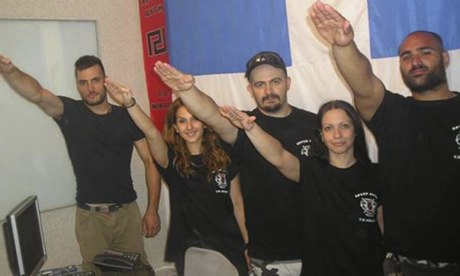Associated Press in Athens theguardian.com, Thursday 23 January 2014
Convict from terror group November 17 released video vowing to resume attacks after vanishing on prison leave
Christodoulos Xiros's internet video statement, in which he criticised the handling of Greece's financial crisis, threatened politicians and vowed further attacks. Photograph: Aristidis Vafeiadakis/ZUMA Press/Corbis
Greek authorities have announced rewards totalling €4m (£3.2m) for information leading to the capture of fugitives in four terrorism-related cases, days after an escaped convict posted a video statement online vowing to resume attacks.
Anti-terrorist police have been conducting a nationwide manhunt since 7 January when Christodoulos Xiros, a 55-year-old serving six life sentences for carrying out killings as part of the November 17 group, vanished while on prison leave.
Five people have been arrested in the past two days in Athens and Greece's second-largest city Thessaloniki in terrorism-related raids, police said.
In a video uploaded on Monday, Xiros criticised the handling of Greece's financial crisis, threatened politicians and journalists and vowed further attacks.
Professing a mix of Marxism and nationalism, the November 17 group killed 23 people, including Greek politicians, businessmen and British, American and Turkishforeign diplomats and military officials, from 1975 to 2000. A €1m (£0.8m) reward was being offered for information leading to Xiros's capture, police said. The same sum would be paid each for the capture of a man and woman who vanished in 2012 following their release from jail after serving the maximum 18 months in pre-trial detention.
Nikos Maziotis and his wife Panagiota Roupa were sentenced in absentia last year to 25 years in prison for participation in Revolutionary Struggle, a group active between 2003 and 2009. The organisation claimed responsibility for attacks including bombing the Athens stock exchange, planting a massive bomb that failed to explode outside Citibank offices and firing a rocket-propelled grenade into the US embassy. Nobody was hurt in the latter attack, and the group has not killed anyone, although it shot and severely wounded a riot policeman in 2009.
The disappearance of Xiros, added to those of Maziotis and Roupa, has been a major embarrassment for Greek authorities.
"The Greek state … will do whatever it can, whatever it has a constitutional duty to do, in order to protect the country, society and its economic development," public order minister Nikos Dendias said in announcing the reward.
Another €1m is being offered for information leading to the identification and arrest of unknown gunmen who shot and killed two members of the Nazi-inspired Golden Dawn party as they stood outside a neighbourhood party office in Athens last November. A third party member was critically wounded.
The justice ministry announced on Wednesday that the governor of Greece's largest prison, near Athens, had been transferred to other duties while an investigation into Xiros's disappearance was under way.
Greece offers reward for information on extremist Christodoulos Xiros | World news | theguardian.com
![The [Greek] European Tragedy](https://blogger.googleusercontent.com/img/b/R29vZ2xl/AVvXsEiWKI5s90SFm1wWTk6bs4p7CgslaC2SnYPsrZhb-B-smOufNNCSxCvpBLI9hOB-LsXZjir_PNmEiMk2-E62F3xkg96IoC6QFAaZAnPRTVH340IN9WBRmWJqPkjWlgyRj3zpALp7h6hvA58/s920/GkBack_new.jpg)









